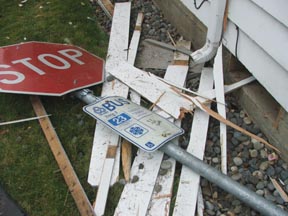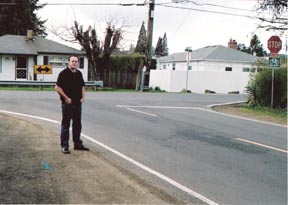 |
||||||||
| MEMO BLOG | Memo Calendar | Memo Pad | Business Memos | Loaves & Fishes | Letters | Home | ||
HEATHER HILL
THE MID-COUNTY MEMO
 |
| The accident in Eric Worley’s yard last summer leveled a stop sign, his fence and his daughters’ backyard toys before impacting the house, cracking the foundation. |
| Photo by Eric Worley |
 |
| Parkrose Heights resident Eric Worley at what he considers an unsafe area around the T intersection at Northeast 111th Avenue and San Rafael Street. Worley and neighbors’ houses have been damaged three times in the last five months. His house is the white one over his left shoulder with the white fence. |
| MEMO PHOTO: TIM CURRAN |
“When this accident happened, it shook me up big time, to the point that I had to do something,” Worley said. Shortly after moving to Northeast Tillamook Street in 2005, he noticed abnormal traffic patterns in his otherwise quiet neighborhood. Behind Worley’s home is where San Rafael Street ends in a T at Northeast 111th Avenue The most disconcerting traffic pattern was nocturnal drag racing on 111th Avenue. “At least once a week,” he said, “they start at one end with two cars, both lanes, through all the stop signs, as fast as you can see.”
Two months after the incident in Worley’s yard, a reckless driver collided with two parked cars a few houses away. Then last February a vehicle swerved into the property directly behind Worley, clipped off part of the garage and floored a fence.
Alarmed, Worley asked if neighbors recalled past accidents. In addition to a number of documented cases, he uncovered many stories of near misses as well as collisions with no injuries or just minor property damage. In five months, auto accidents had accrued $60,000 worth of property damage for Worley and his neighbors. Though driver error primarily accounted for these accidents, other factors contributed as well.
Residential streets between Northeast 122nd and 102nd avenues are popular streets for cutting through the neighborhood. Designed for local traffic, and calmed only by stop signs and 25 mph speed limits, these streets support thousands of vehicles daily. “We have all these cars,” Worley explained. “It is just a high-traffic street that needs to be evaluated or reengineered.”
Worley said that after his accident, “The first thing I did was to go down to the neighborhood association (Parkrose Heights Association of Neighbors via the East Portland Neighborhood Office) to get involved. The other thing I did was contact Portland Department of Transportation and said, ‘Hey, I think you should come out here and look at these streets and see if anything can be done.’ “ They informed him speed bumps had been approved by the city for San Rafael from Northeast 117th to 122nd avenues. Worley wishes to extend them to 111th Avenue, but funding remains a hurdle.
To take advantage of the city’s speed bump program, two-thirds of property owners must consent to them and the neighborhood partially shoulders the cost. “I don’t know if the residents don’t know or if they’ve even been asked,” Worley said. “I have a petition of about 40 residents saying we need something done, but I’m not sure if they know what their options are.”
When Worley heard about Safe Routes to School, a program designed to develop safe paths for children to walk or bike to school, he thought he found the answer. With Sacramento Elementary School only blocks away, Worley appealed to have the speed bumps funded through the program. While Safe Routes recognized the need for speed bumps on San Rafael, it remains low on the school’s list of priorities. Projects near the top include: traffic calming for Northeast Klickitat Street, sidewalks on Sacramento Street, signage around the school, a new bike rack and painting the parking lot.
Worley and PHAN have questioned the relevance of this last item. “We’re two to three blocks from the school and this is really a hub of where all of this traffic meets. Buses and people use this street (111th Avenue) as well as Sacramento to get to school. I’m trying to see what ways we can prioritize these things a little better.” Worley contended, “We can take that money and fund two projects on San Rafael, one being the speed bumps and the other being the crosswalk to stop a major part of the traffic problem.”
PHAN aims to improve the Parkrose Heights community (between Northeast 102 and 122 avenues south of I-84 and north of Northeast Halsey street) by uniting neighbors into action on its behalf.
Hoping to prove that parking lot maintenance does little to encourage kids to walk or bike to school, Worley said, “They’ve got this money to help out these neglected streets and also help kids walk and bike to school instead of having parents drive their vehicles to drop them off, and to me painting the parking lot is basically telling you to drop your kid off in the car when the whole point is getting kids to walk.”
As of this writing, the issue is still under debate. Whatever the decision, Worley won’t give up. “I need a relief to the problem. My little girls are going to need to walk to school.”
Carol Williams, PHAN chair, concurred. “I don’t know if people are aware how many accidents are out here and how fast these cars go. It’s another accident waiting to happen.”
Worley has remained active in the association. “There are a lot of advantages to going to those meetings,” he said. “You should at least pick something in your neighborhood that you can volunteer or help out.”
While attending and volunteering at a neighborhood association may not fit into everyone’s schedule, other options exist for residents to help improve their community. Worley pointed to the intersection on Northeast 33rd Avenue at Belmont Street where residents united to create a neighborhood gathering spot.
“They used that method of traffic calming by literally having the whole neighborhood come out and paint and landscape the common areas. Some of those ideas would be great for this intersection. We need to figure out a way to do it on our own, and that is the way that that neighborhood did that. They said, ‘This is our way of turning these things around,’ and it actually has.”
In a survey conducted by PHAN last year, by a wide margin residents rated speed and traffic their number-one concern. “There are some scared people around here who want something done,” Worley said.
 |
 |
 |
MEMO Advertising | MEMO Archives | MEMO Web Neighbors | MEMO Staff | Home